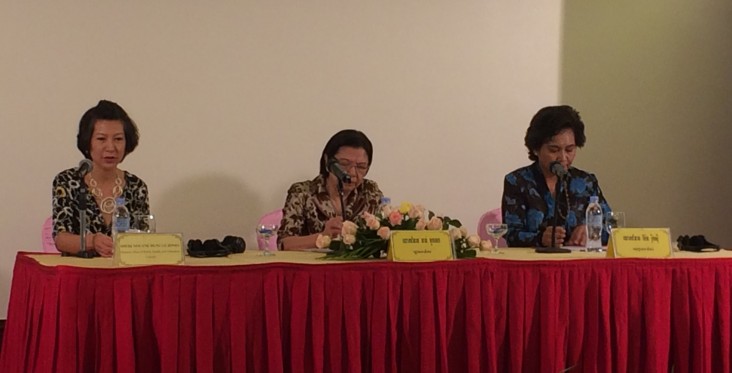
Your Excellency Tan Voucheng, Secretary of State, Ministry of Health, and Chair of the Gender Mainstreaming Action Group
Distinguished colleagues from the Health Policy Project, the WHO, and UNFPA
Ladies and gentlemen
It is my great pleasure to join you today for this important meeting.
In Cambodia today, women are living longer, healthier lives than their mothers and their mothers before them. As the nation’s health system and economic opportunities continue to improve, Cambodian women have better access to higher-quality health services and products for themselves and their families. Giving birth is safer than it has ever been in Cambodia, for both mothers and their newborns. Contraceptives and other health commodities are more readily available and affordable. Deaths due to the most lethal diseases of the past – such as tuberculosis, malaria, and HIV – are declining each year.
In general, the health and welfare of women in Cambodia is improving dramatically. The country’s maternal mortality rate dropped by over 50% between 2005 and 2010! I want to commend the leadership of the Ministry of Health and its development partners on this incredible achievement.
That is the good news. But as we meet today, too many in Cambodia suffer from gender based violence. Violence against women remains widely prevalent with indications of increasing incidence in some forms, such as rape. In addition to the high rates of violence, issues of stigma and shame keep many survivors from speaking out or seeking the necessary care and assistance after they have been victimized.
Your efforts to focus the tremendous resources and capacity of the Ministry of Health to reduce violence against women have potential for huge impact. If successful, what you accomplish here can greatly improve the lives of women and families across Cambodia for generations to come.
As an important step towards improving the health and safety of women and families across Cambodia, the Ministry of Health has developed the Gender Mainstreaming Action Plan 2014-2018. USAID is honored to be able to provide assistance through the Health Policy Project towards this effort. This builds upon our strong partnership and collaboration through the Lower Mekong Initiative, including productive technical exchanges between the governments of Cambodia and Laos this past year.
The Government of Cambodia recognizes that investments in gender not only benefit women, but also have a profound effect on entire families and communities, including improving health outcomes for Cambodia’s children. For this reason, efforts are underway to mainstream gender issues into all programs at the national and sub-national levels. The Gender Mainstreaming Action Group is making this possible by building Cambodia’s capacity to use evidence for gender analysis and advocacy.
The Gender Mainstreaming Action Plan, drafted by the Ministry of Health with support from UNFPA, is now incorporating the latest data and information to further strengthen efforts. I am very pleased that the Ministry of Health and related departments and programs are participating today, fully committed to incorporate gender perspectives into the policies and approaches of their respective programs.
Once the Action Plan is finalized, successful implementation in the coming years will require continued coordination, commitment, and resource mobilization. I am confident that the strong and capable leadership and commitment of Excellency Tan Voucheng, as the Chair of the Gender Mainstreaming Action Group, will result in success.
You can count on USAID’s continued partnership in this important effort.
Thank you.
Related Speeches
- Remarks by Christina Lau, Deputy Director, Office of Public Health and Education, USAID/Cambodia, Opening Ceremony of the Kick-Off Workshop for “One Health Workforce”
- Remarks by Sheri-Nouane Duncan-Jones, Director, Office of Public Health and Education, USAID Cambodia, Dissemination Workshop on Integrated Behavioral and Biological Survey among Female Entertainment Workers in Cambodia in 2017
- Remarks by Mr. Noah Mathew Sprafkin, Maternal Child Health/Family Planning/Nutrition Team Leader, USAID Cambodia, Orientation Workshop on Regulations for Health Practitioners Law







Comment
Make a general inquiry or suggest an improvement.